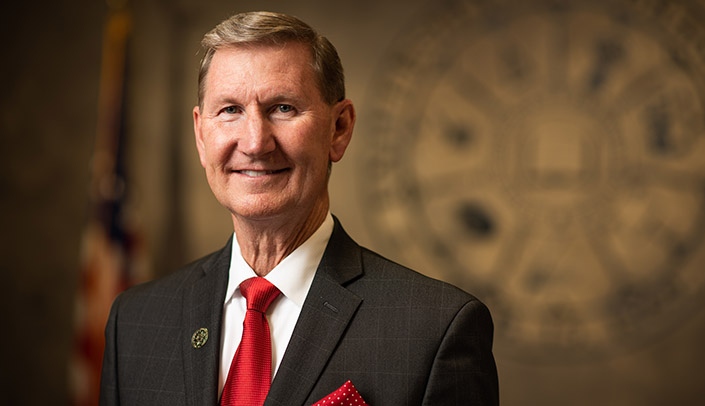The University of Nebraska System will work to set “a new model for student access and success” and invest in people, workforce development and research strengths under an updated strategic plan released today by President Ted Carter.
The plan — an update of the document the NU System created in 2020 following a collaborative process with students, faculty, staff and stakeholders from across the campuses — is accompanied by new sets of metrics by which the university will measure its progress in key areas such as enrollment, student outcomes, research, workforce development, faculty salaries and spending efficiencies.
The goal, Carter said in remarks to the Board of Regents, is to provide Nebraskans confidence about the return on their investment in the university at a time when higher education is uniquely positioned to help address the most crucial economic development and quality of life issues facing the state.
“It is remarkable to look at all we have accomplished together over the past few years, even under extraordinary circumstances,” Carter said. “From creation of the Nebraska Promise, to a historic deferred maintenance partnership with the state, to a multi-year financial plan to emerge from the pandemic stronger than before — we have been focused on actions to serve Nebraskans.
“Now it’s time to do more. The value proposition for higher education has never been greater. The needs of our state, our workforce and the world are as urgent and complex as they have ever been. Higher education must help lead the way forward.”
The full, updated strategic plan is available here. Carter said it aims to accomplish five broad goals:
1. Create a new model for student access and success, through an expanded Nebraska Promise program providing tuition-free education to qualifying Nebraska students; growth in NU’s Open Nebraska initiative to reduce textbook costs; and new strategies to reach the 300,000-plus Nebraskans with some college but no degree, among other efforts.
2. Win the competition for talent, heeding what Carter deemed a “clarion call from business leaders” to significantly grow Nebraska’s skilled workforce, including in such fields as health care, engineering, teaching and IT. In calling 2022 “the year of the internship,” Carter said every student should have access to a paid internship, study abroad or some other experiential learning opportunity.
3. Take care of people, the university’s greatest asset. Carter said the university will become a destination of choice for students, faculty and staff with competitive faculty salaries that are in line with peer institutions, expanded mental health services, quality facilities and regular climate surveys to assess strengths and opportunities in becoming more welcoming and inclusive for all.
4. Work with partners to grow areas of research strength, including agriculture, cancer and public health, early childhood education, national defense and rural prosperity — areas important to the state where University of Nebraska faculty have proven records of expertise and partnership.
5. Set a high bar for accountability in the use of resources. Carter pointed to the newly approved 2022-23 operating budget, which assumes almost $50 million in spending cuts by the end of the fiscal year in order to achieve a tuition freeze, as the latest example of the university’s commitment to becoming as effective and efficient as possible with its dollars.
Carter thanked the system-wide team that has continued to provide input and ideas into the strategic planning process. He said the plan will continue to be a “living document” that evolves with the needs of students and the state.
